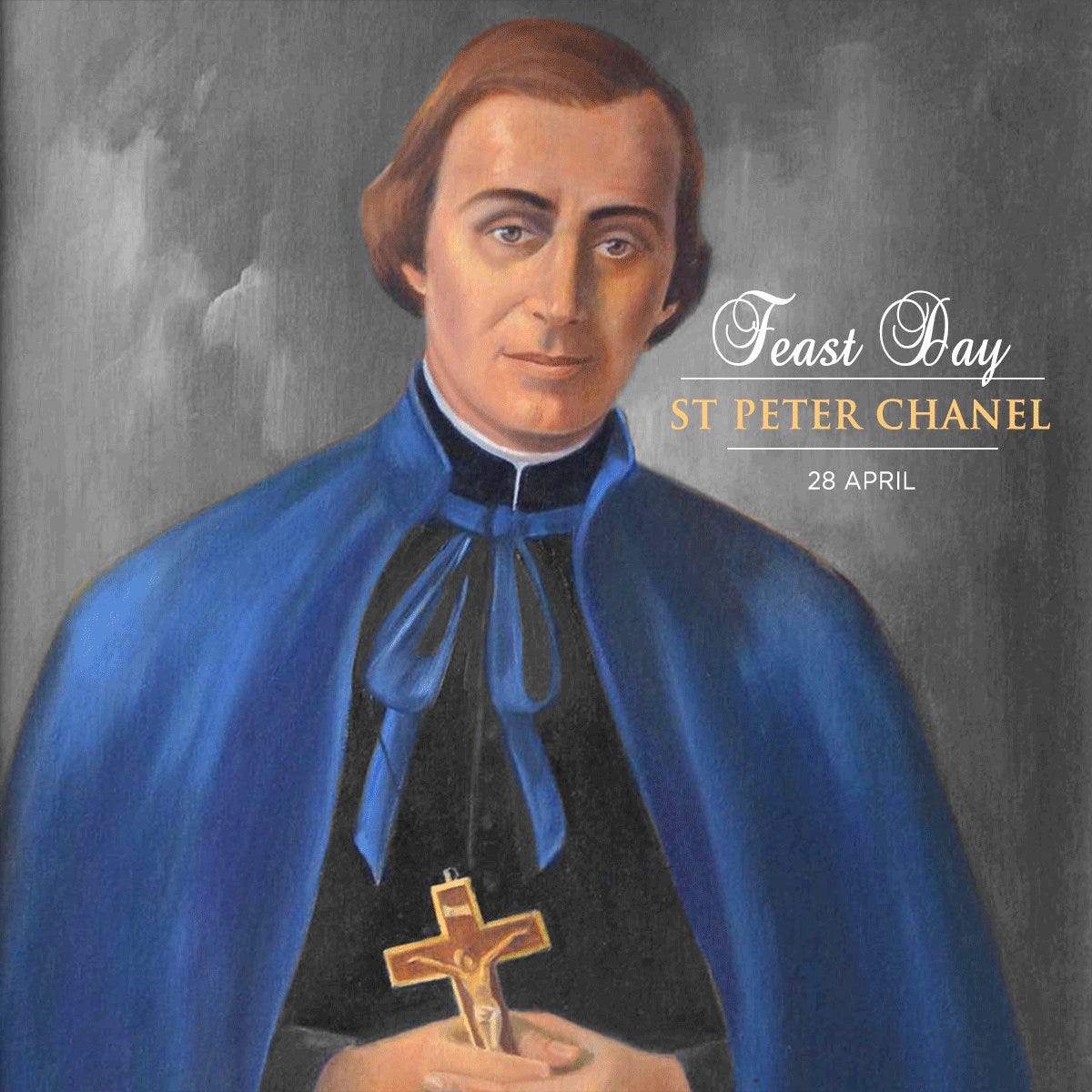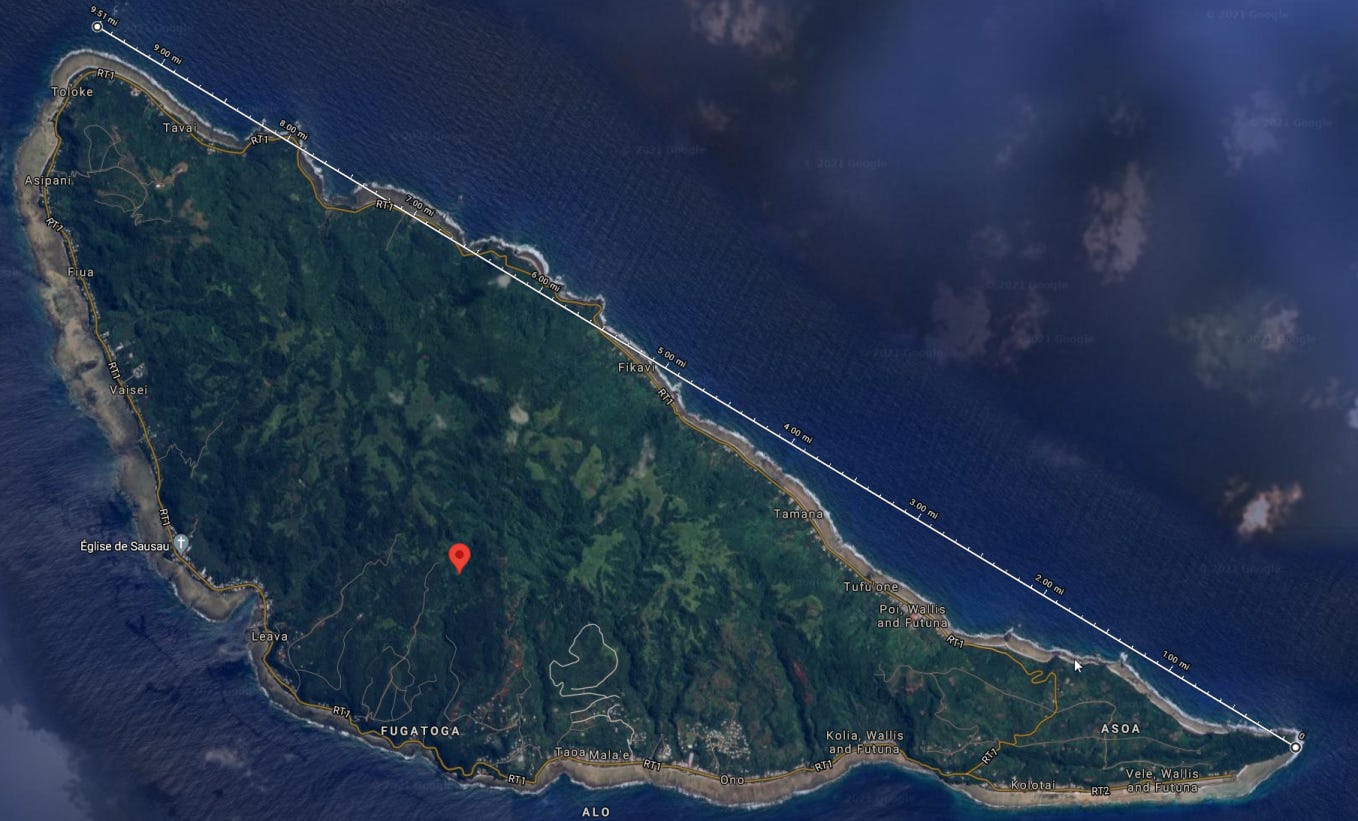St. Peter Chanel
How kindness saved an entire people
Today, April 28, is the feast of St. Peter Chanel.
In 1837, St. Peter was just 33 years old when he volunteered to leave his French homeland to serve Our Lord as a missionary. His decision to become a missionary was anything but sudden. In fact, he had set his heart on being a missionary since he was just 14. Time and again, Peter was actually denied the opportunity to be sent. However, after 19 years of patiently waiting, he was finally granted his wish. Ultimately, this decision would seal his fate, and indeed, those of tens of thousands of other souls for the next two hundred years.
Peter arrived on the tiny Pacific island of Futuna to what would properly be called hellish conditions. I mean this quite literally: tribes worshipped their own evil gods and had lately practiced cannibalism.
One may well wonder what kind of man is courageous enough to step, seemingly unarmed, up to the very gates of hell, and then knock on the door. The only reasonable answer would be that only one Man would be so bold: the God-man. Peter simply made the words of St. Paul his own, “yet I live, no longer I, but Christ lives in me.”
For two years time, Peter did not preach the Gospel to the island natives. He couldn’t. He had to first learn their language. There is a more universal language though, spoken by all men, and understood by all men. The language of true kindness toward others. Peter spoke this language fluently. He tended the sick. He prayed at the bedside of the dying. Peter became known by the natives simply as “the man with the kind heart.” Consider how extraordinary this title is. I believe we naturally tend to describe people by what we consider their most unique feature. This was a man who did not look like anyone else, did not dress like anyone else, and did not sound like anyone else. What those souls found most unique about Peter though were none of those things. What they found most unique about him was his kind heart.
Peter did not preach the Gospel for two years? On the contrary, Peter preached one of history’s most profound sermons for two years, simply using his heart rather than his lips. After mastering the local language, Peter was able to fulfill Our Lord’s words, “from the fullness of the heart the mouth speaks.”
Peter’s efforts were soon rewarded by many conversions among the island natives. Note well though that it was not the brilliance of Peter’s preaching that converted the natives. By all accounts, Peter was quite intelligent. However, Peter’s success did not come about through brilliant logical syllogisms or dramatic deconstructions of the arguments of the Futuna people. Of course, as St. Peter the Apostle tells us, we must “Always be ready to give an explanation to anyone who asks you for a reason for your hope.” What this verse presupposes though is that people will actually ask what the reason is for our hope. Peter sowed the seed of the Gospel for two entire years. Before the natives knew who Christ was, they saw what Christianity was. Peter fulfilled the new commandment of Our Lord, “That you love one another, as I have loved you.” Peter loved those people with agape — as Christ loved them. This is why the people were ready to ask Peter what the reason was for the hope that was in him.
Charity must always precede apologetics. Indeed, charity is the greatest apologia and that upon which all others must be based, if they are to bear any fruit. Christ does not tell us that others will know we belong to Him by our intelligence, or cunning, or talents. Rather, “By this shall all men know that you are my disciples, if you have love one for another.” Our talents are not ends, they are means to serve the end of charity. Far too often, we mistake the means for the end, “I will use my God-given intelligence to win this argument, to show forth to others…my God-given intelligence.”
Peter never made this mistake. His intelligence was used to give an account for the reason for the hope that was in him.
Soon, more and more natives wished to become catechumens, including the son and daughter of the king of Futuna, Niuliki. However, the king was a kind of high-priest of the island’s old religion and feared losing power. After learning about his son’s conversion, he made known to his prime minister, Musumusu, that he wanted Peter dealt with.
Soon after, Musumusu and four other men went to Peter’s hut in order to kill him. Several blows with clubs were struck about Peter’s head and arms. Peter repeated “Very well” as the blows were being struck. The final death stroke was delivered by Musumusu himself using a hatchet. Peter’s last words, delivered just before the final blow were, “My death is nothing but good to me.” He knew he was dying as a martyr and would soon see Him who he had faithfully served .
“My death is nothing but good to me.” Peter’s death was likewise nothing but good to the people of Futuna. Perhaps if king Niuliki was more familiar with Christianity, he would have realized that his actions would not have the intended effect. Indeed, it would have the exact opposite. As has been shown time and time again throughout her history, “the blood of the martyrs is the seed of the Church.” And so it was again in Futuna. The catechumens left behind began preaching to the other inhabitants. Within 24 months, the entire island had converted to the Catholic faith. Not a majority of the island, the entire population. Musumusu, the murderer of Peter, joined the catechumens, asked for baptism, confessed his sin, and earnestly asked forgiveness. Indeed, we know of the death of St. Peter, and his last words, from the testimony of Musumusu. Or rather, we ought to call him “Maurice,” his Christian name taken at Baptism. When Maurice died, he asked to be taken to the hut where St. Peter lived, so he could die near the saint. He expressed, again, deep repentance for his past sins, and died near the saint.
Christianity is a religion of seeming contradictions. “Love your enemies and pray for those who persecute you.” I believe we can make the shocking claim that no other saint in heaven loved and prayed for Maurice more than St. Peter. After all, why would we assume that prayers for our enemies would stop after death? I believe St. Peter, having been purified through the blood he shed for Christ, would be all the more willing to offer this blood for the soul of Maurice. Then, it is remarkable to imagine that one of the first souls Maurice would have encountered is the saint who he murdered. But I think Maurice would have recognized him immediately as, “the man with the kind heart.”
Epilogue
The blood of St. Peter was the seed that bore fruit 100-fold. Futuna became Catholic, and stayed Catholic. Today, at least 99% of the Island is still Catholic. If you look on Google Maps, you’ll see that there is one road (Route 1) that goes around the perimeter of the island, around 25 miles or so. I counted 19 Catholic churches in that 25 mile trip. Every little village has its own Catholic Church. A few examples:
Friends, let’s take St. Peter as our model, so that when others speak of us they may say, “Oh yes, the one with the kind heart.”
St. Peter pray for us!






